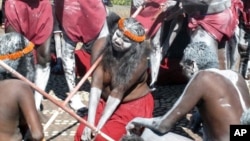Australia’s Northern Territory is to rename racist names on a number of landmarks that have long demeaned indigenous groups. It follows similar measures in the state of Queensland.
The official Northern Territory place names register shows several entries with the pejorative term "blackgin."
This refers to a phrase used by white Australians to describe an Aboriginal woman, or "gin," who were used for sexual services. Other racially insensitive place names, including "murdering creeks" and "skull holes," which are derived from the slaughter of indigenous people, will also be changed.
The Northern Territory government has asked a formal committee to look at ways to replace offensive place names with Aboriginal words or phrases.
The Northern Territory’s chief minister, Michael Gunner, says some colonial-era place names should be changed.
“There are some obvious ones that will be fixed up, but I think it is really important [to] take a deep breath, work through these things in a way that provides proper meaning and recognition of the First people and those languages that were here thousands of years before we were," he said.
Similar moves are underway in the state of Queensland, where racist names are being officially wiped off the map.
The best known example of a landmark being successfully changed to its Aboriginal designation is Uluru, previously known by its colonial name Ayers Rock.
Academics warn, however, that the moves might not be universally popular in Australia, a nation they say has had problems acknowledging its often brutal colonial history, where settlers killed large numbers of Aboriginal people.
In July, researchers published what they said was the most comprehensive map to date to detail the massacres of indigenous Australians by European settlers.
Australia’s original inhabitants often complain about racism and marginalization. They also suffer disproportionately high rates of ill-health, unemployment and imprisonment.




